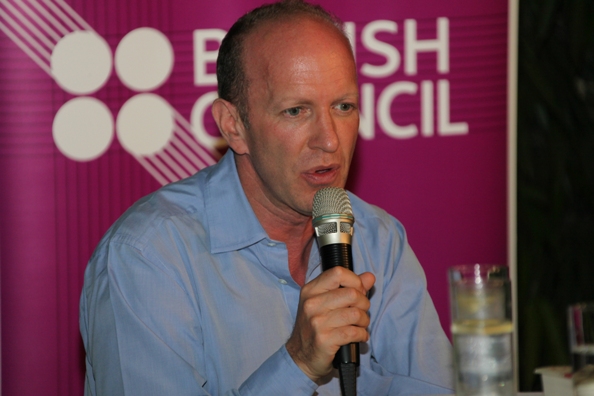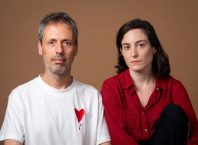
British Ambassador to Israel Matthew Gould held a reception in honor of Simon Sebag Montefiore’s Jerusalem: the Biography (W & N 2011) on July 27, 2011. Eschewing long ceremonial speeches in favor a conversation as direct and lively as Sebag Montefiore’s immensely readable history of Jerusalem, the Ambassador conducted an interview with the author, raising many interesting questions in relation to the book, the choices made in the process of writing, and the Montefiore family history.
Ambassador Gould opened by asking Sebag Montefiore, who has written three books about Russia, why he waited so long to write a book about Jerusalem. He replied that he had always been obsessed with Jerusalem, saying, “I always wanted to read a book about Jerusalem that dealt with the people,” and quoted Disraeli’s saying “when I want to read a book I write it.”
When asked to name the most difficult part to write, Sebag Montefiore said that writing about the “modern time was the hardest, I had it read by Israelis, Palestinians, Armenians…of course, not every side size of Jerusalem is in the book. It’s a challenge to write a book accepted by all sides.” Recounting an anecdote about Sir Ronald Storrs, the Governor of Jerusalem in 1917, who managed to fall out with the Jews and the Arabs soon after his arrival, and was told by his superior that he should continue with that policy of non-favoritism; Sebag Montefiore concluded, “I hope that I’ve pleased neither side.”
Ambassador Gould noted that Simon Sebag Montefiore comes from a family that is “a part of modern Israeli history” and asked the author about his relationship to family history.
“Moses Montefiore was a Zionist before Zionism existed,” said Sebag Montefiore, “and also a great British imperialist. Claude Montefiore led the campaign against the Balfour declaration, so we covered all sides…Seder nights were formal with bowler hats and black suits, it was quite rammed down our throats what a paradigm he was.”
“Did he have a dark side,” asked the Ambassador.
Sebag Montefiore confessed that “Growing up we were slightly sick of Sir Moses… he is a heroic figure…like every Victorian he had a secret life. At 81 he fathered a child with a 16 year old housemaid.”
When asked whether he has a favorite forebear, Sebag Montefiore did not hesitate to name Major Geoffrey Sebag Montefiore who was police chief of Jerusalem from 1918 to 1920, whose responsibilities included policing the brothels of Jerusalem, and quoted a message from the Major: “Jerusalem quiet – VD rampant.”
Taking a more serious turn, the Ambassador asked Sebag Montefiore whether he feels burdened by “the weight of history” as someone who represents the UK in Israel. Sebag Montefiore tossed the question right back at Ambassador Gould, asking, “Do you feel responsible?”
“I try and duck responsibility,” quipped Ambassador Gould, while affirming his belief that Britain’s contribution to Israel, in many areas, is significant.
In terms of his relationship to the history of British involvement in Israel, Sebag Montefiore said, “As an individual I feel responsibility. Britain screwed up here hugely in many ways,” mentioning drastic shifts in policy and decisions taken, yet continued to say, “I don’t doubt that there should be two states here. I do think the way they left in ‘48 was pretty unforgiveable. The way you leave a party is important. The way Britain left is irresponsible.”
“Does Jerusalem disappoint you?” asked Ambassador Gould.
“I think it’s the most beautiful city in the world,” said Sebag Montefiore, yet acknowledged that it is also, “vulgar, angry, and messy.”
“You stopped your narrative in 1967, what do you think Jerusalem will look like in 10 – 20 years?” asked Ambassador Gould.
Sebag Montefiore responded, “I can imagine three Jerusalems – one, exactly the way it is now only more so, a religious city center for Jews and fundamentalist Muslims who jostle together, with few Christians. The second is a Jerusalem that does not exist anymore, destroyed by fanatics.” The third Jerusalem envisioned by Sebag Montefiore is one in which “there will be some sort of peace process that allow settlement for both sides.”





